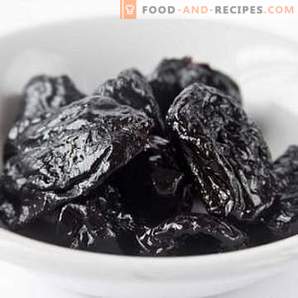
Fish products in the human diet should always be present. And no matter what kind of fish it will be: fried, salted, boiled or dried. After all, the fish is rich in proteins, fats, minerals, amino acids and vitamins.
Dried fish is good in and of itself, and as an addition to potatoes or beer. And so the avid fishermen, having harassed bream or a roach, upon arrival home, enthusiastically take up the drying of fish.
Drying fish is a simple matter. Especially if the weather pleases spring cool sunny days. These are the days that are best to choose for drying so that the fish turns out to be tasty and “right”.
And when the fish is completely ready, the question arises: how to save it so that it does not disappear?
The most important condition, which, by the way, must be observed when storing any products, is the excellent condition of the fish itself. After all, if a fish prepared for storage looks suspicious or has an unpleasant odor, then no matter how correctly it is tried to be kept in its original form, it will surely deteriorate.
What a dried fish should look like
Dried fish should have dry scales as well as dry gills. The slightest sign of increased humidity, especially in the abdomen, suggests that the fish is no longer the first freshness and it is impossible not only to be kept, but to eat.
- Dried fish has a solid back and elastic flesh.
- If the fish is small, then looking at it, it seems that it is translucent.
- Dried fish should not be covered with salt.
- Meat from dried fish of a pleasant pinkish color.
- The smell is peculiar, free from impurities, and even more signs of spoiled meat. Dried fish smell like dried.
Methods for storing dried fish
- The fish deteriorates quickly, even salted or dried, so it’s best to store it in the freezer. In frozen form, it will be stored for a year, but still the aroma and taste of freshly baked fish will disappear. Moreover, it is necessary to take into account that dried fish has a specific smell, which is unlikely to appeal to other frozen products.
- Dried fish can be stored in a refrigerator. In this case, the fish is wrapped in several layers of wrapping paper, but so that it can “breathe”. If the fish is wrapped in a newspaper, then the first layer should still be clean paper, as printing ink, to put it mildly, will not bring.
- If there is a cool storage room or cellar, then the best way to keep dried fish is to hang it up by packing it in bags of loose fabric . The humidity in the room should not exceed 80%. Otherwise, undesirable processes will occur in the fish, which will cause damage to the fish.
- Dried fish can be stored on the balcony, also hanging it and securing it with gauze from flies. But we must remember that when high humidity, for example, in rainy weather, the fish can mold and spoil. And on hot days, the fish is very dry. But it is at best. In the worst case, it will disappear due to the fact that in the heat of fish oil is rancid.
- Dried fish can be stored in tin or glass jars with well-closed lids in a dark, cool place.
- An unusual way of storing dried fish is creating a vacuum. To do this, put the fish in a jar and put a lit candle. The jar is closed with a lid. When all of the oxygen is burnt, a vacuum is formed in the can. And the fish is "preserved."
For mass storage of fish they use all kinds of packaging: from vacuum packaging and linen bags to wooden boxes and baskets of wicker. But what exactly can not be stored fish, so it is in plastic bags, as well as in foil. Even dried fish does not withstand such barbaric treatment and soon becomes covered with mold and disappears.
But in whatever conditions dried fish is kept, it is best to use it shortly after production.











































